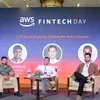AWS can be a great enabler for India to jump a tech gen in AI and ML: Amazon Internet Services' Rahul Sharma
AWS wants to lead India into becoming a cloud-first economy. From providing streams of open data and offering easy-to-use AI/ML services to skilling millions of youth, the company is out to service its biggest customer: the Indian citizen.
Amazon Web Services (AWS), Amazon’s cloud arm, needs no introduction. It is, after all, the world’s largest cloud service provider with a revenue run rate of $31 billion until the last quarter. It has been servicing business customers globally for the past 13 years.
In 2010, AWS introduced its Public Sector programme to support tech-led innovation in government, education, healthcare, and nonprofit organisations. With funding up to $100,000 in some cases and $100,000 worth of AWS Promotional Credits, the division has helped over 2,000 government agencies and public institutions get on cloud seamlessly.
In late-2017, AWS brought its public sector business to India. It was empanelled by the Ministry of Electronics and Information Technology. Since then, a few State governments in India have implemented a ‘cloud-first’ policy and successfully moved their workloads to the AWS cloud.
Besides the Central and State governments, AWS is also actively working with startups that are leading innovation for social good, transforming the way private and public organisations operate, and also partnering with top educational institutions to bridge the country's massive skill gap.
In an exclusive interview with YourStory, Rahul Sharma, President - Public Sector India & South Asia, Amazon Internet Services sheds light on the company’s “govtech” play, factors that are driving India’s rapid cloud adoption, re-skilling initiatives for hundreds of millions of Indians, and how it is helping generate an AI/ML talent pool, which is the need of the hour.
_(1)1563968201471.jpg?fm=png&auto=format)
Rahul Sharma, President - Public Sector India & South Asia, Amazon Internet Services.
Edited excerpts of the interview:
YourStory: How is the AWS public sector business shaping up in India?
Rahul Sharma: AWS has two verticals - commercial business and public sector. For the latter, our mission is to make public institutions successful so that we can create citizen impact at scale. The customer here is the citizen, and we work backwards from there. Our public sector business covers the Central and State governments, all PSUs, NGOs, educational institutes, and public healthcare. The common thread is citizen impact.
We were the first MNC cloud service provider to be certified by MeitY in October 2017. From that point onwards, the business started to come together. We were also empanelled by the Government of Maharashtra last year. The State has a cloud-first policy, and that I think is the right way to go.
YS: What were the first steps after the empanelment? How did you set the ball rolling?
RS: I’d like to reiterate a few things about AWS here. We are essentially builders. We always look at customer outcomes in the long term and then work backwards. When we came into this business, it was about setting a mission. Our first mission was that we wanted to make an impact on the life of every Indian citizen. So, we looked at the biggest their needs and priorities.
Think about skilling: 400-450 million people have to be skilled or re-skilled over the next few years. These stats are from the Ministry of HRD. Now, this is a huge impact area from a technology point of view. When you look at healthcare, 500 million have to be given access to primary healthcare under Ayushman Bharat Yojana.
Then, take livelihood: 800 million people depend on agriculture as a primary income source. Think about how tech can be leveraged in these areas at scale.
Or, if you think about inclusion - better transport or smart cities or digital literacy or access to citizen services. All of these are huge impact areas. So, we decided to focus on these, and use new technologies like AI and ML to impact at scale.
YS: How are you implementing this at the ground level?
RS: We want the government to experience technology in a new form - whether it is procuring or using that technology. Let’s take one aspect, say ML. We have to look at all the areas that need to come together cohesively to make it work.
We have a lot of data, yes. But, ML-ready open data is scarce in India. And that can be the biggest enabler. We have the AWS Open Data Registry that holds terabytes of data in an ML-ready form.
Several startups are using our satellite imagery data to be able to have an impact on farming and agriculture. Janaagraha, for instance, created the first open data set on our registry last year. Their use case was storing the feedback of all citizen services. So, AWS is focused on creating these streams of open data that startups could use for social good.
YS: How do you identify the startups you want to engage with for your public sector business?
RS: Last month we had an event with the Maharashtra government for finding startups that can use AI and ML for social good. We had government people and AWS experts on the jury. The startups that we picked will work closely with us, and we will help them get actual projects from the government.

Many of the startups come through our Activate, and EdStart programmes. These are resources for us to identify them.
YS: How much of an active role does the government play in your partnerships with startups?
RS: A lot, and there is a lot of intent as well. The CM’s offices take it forward as a programme. They identify use cases. A number of government divisions are allocating budgets for startup innovation. We want to make sure that there is adequate discovery, technology, and the right guidance to make this happen.
YS: How ready are our State governments when it comes to cloud adoption? Is everyone aligned with the Centre?
RS: There is always a leader.

Governments now have access to technology that gives them agility. There is safety, security, scalability, and innovation too.
YS: How do you convince governments that cloud is entirely secure?
RS: We let our customers speak. At the AWS Cloud Summit in Washington, the CIO of the CIA stood up and said, “At the weakest point, the cloud is more secure than the strongest data centre implementation.” That is a significant statement to make. We have ML services that can predict potential threats.
YS: What is the tech enablement you do for public sector partners?
RS: We have the best breadth and depth of services any provider can offer.
Last year, we launched more than 1,900 services, of which 200 were AI services. So, our platform gives you access to multiple levels of ML and AI capabilities. You have full control over how you want to deploy your models, what frameworks you want to use, etc. You do not have to get into the heavy lifting of managing it end-to-end. You have AWS SageMaker for that.
Tens of thousands of customers are using it today. It gives them the capability of quick outcomes without having to worry about managing the technology. They get the data and the tech from us. When startups that are working with the government have access to this, they can get on the path of innovation.
YS: Take us through the skilling initiatives AWS has undertaken.

In India, we have tens of thousands of people who are a part of this already. The Andhra Pradesh State Skill Development Corporation (APSSDC) got in 60,000 students through the AWS Educate programme. One pilot had 9,000 students, who have completed their learning paths and got their certificates. This is open to not just students; even educators can access the platform.
YS: Which are the skills that are most in demand?
RS: Cloud is a very hot skill. It was included in World Skills this year. AI, ML, data science - are all in demand. India is short of a few hundred thousand data scientists right now.
YS: Besides AWS Educate, are you trying to bridge the skill gap through partnerships with educational institutes?

YS: What is the measurable impact AWS can make in India's public sector by 2021-22?
RS: Think about the opportunity. It is huge. Any number I tell you can be crossed. So, we are not measuring the opportunity. We are asking: Can we help a technician, a mason, a retailer? Can we scale up digital literacy in a big way?
About 60 million people are to be trained in digital literacy under PMGDISHA (Pradhan Mantri Gramin Digital Saksharta Abhiyan). Twenty million have been trained. They are using AWS. So, I don’t think we can constrain the opportunity. It is not about AWS alone. Can we create a flywheel? We may do X, but can we create an environment that can do 100X or 1000X? That’s the intent.
YS: Finally, what is the biggest challenge you face in bringing cloud to a fragmented public infrastructure like India's?
RS: May be two-three years ago, policy could have been an issue. But I do not see any major problem now. There is enough intent and a clear direction from the government. People are fast adopting tech. Everyone is aligned to a vision.
In terms of maturity, we are starting out compared to some other markets. But, I believe India can jump a tech generation in AI and ML and bring impact at the bottom of the pyramid.
The government wants to create 100,000 digital villages. We have the physical infra, the connectivity, and startups have the tech and innovation. There are no constraints of scale. India is moving far better in terms of real, tangible outcomes. A full ecosystem is going towards the outcome.
(Edited by Teja Lele Desai)











